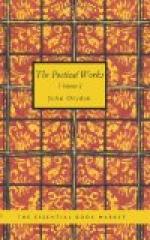Let Father Flecknoe fire thy mind with praise,
And uncle Ogleby thy envy raise.
Thou art my blood, where Jonson has no part:
What share have we in nature, or in art?
Where did his wit on learning fix a brand,
And rail at arts he did not understand?
Where made he love in prince Nicander’s[158] vein,
Or swept the dust in Psyche’s humble strain? 180
Where sold he bargains, whip-stitch, kiss my a—e,
Promised a play, and dwindled to a farce?
When did his muse from Fletcher scenes purloin,
As thou whole Etheridge dost transfuse to thine?
But so transfused, as oil and waters flow,
His always floats above, thine sinks below.
This is thy province, this thy wondrous way,
New humours to invent for each new play:
This is that boasted bias of thy mind,
By which one way to dulness ’tis inclined: 190
Which makes thy writings lean on one side still,
And, in all changes, that way bends thy will.
Nor let thy mountain-belly make pretence
Of likeness; thine’s a tympany of sense.
A tun of man in thy large bulk is writ,
But sure thou’rt but a kilderkin of wit.
Like mine, thy gentle numbers feebly creep;
Thy tragic muse gives smiles, thy comic sleep.
With whate’er gall thou sett’st thyself to write,
Thy inoffensive satires never bite. 200
In thy felonious heart though venom lies,
It does but touch thy Irish pen, and dies.
Thy genius calls thee not to purchase fame
In keen Iambics, but mild Anagram.
Leave writing plays, and choose for thy command,
Some peaceful province in Acrostic land.
There thou mayst wings display and altars[159] raise,
And torture one poor word ten thousand ways.
Or, if thou wouldst thy different talents suit,
Set thy own songs, and sing them to thy lute. 210
He said; but his last words were
scarcely heard:
For Bruce and Longville[160] had a trap
prepared,
And down they sent the yet declaiming
bard.
Sinking he left his drugget robe behind,
Borne upwards by a subterranean wind.
The mantle fell to the young prophet’s
part,
With double portion of his father’s
art.
FOOTNOTES:
[Footnote 139: ‘Mac Flecknoe:’ Richard Flecknoe, from whom this poem derives its name, was an Irish priest, and author of plays.]
[Footnote 140: ‘Heywood and Shirley:’ play writers in Queen Elizabeth’s time.]
[Footnote 141: ‘St Andre:’ a famous French dancing-master.]
[Footnote 142: ‘Psyche:’ an opera of Shadwell’s.]
[Footnote 143: ‘Singleton:’ a musician of the time.]
[Footnote 144: ‘Nursery:’ a theatre for training actors.]




